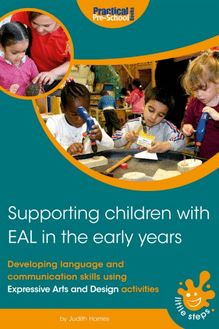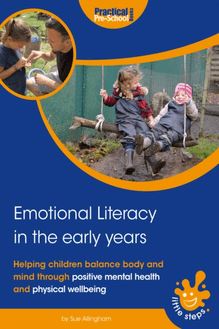Emotional Literacy in the Early Years , livre ebook
58
pages
English
Ebooks
2020
Vous pourrez modifier la taille du texte de cet ouvrage
Obtenez un accès à la bibliothèque pour le consulter en ligne En savoir plus
Découvre YouScribe et accède à tout notre catalogue !
Découvre YouScribe et accède à tout notre catalogue !
58
pages
English
Ebooks
2020
Vous pourrez modifier la taille du texte de cet ouvrage
Obtenez un accès à la bibliothèque pour le consulter en ligne En savoir plus
Emotional Literacy in the early years
by Sue Allingham
Published by Practical Pre-School Books, A Division of MA Education Ltd, St Jude’s Church, Dulwich Road, Herne Hill, London, SE24 0PB. Tel: 020 7738 5454 www.practicalpreschoolbooks.com
Copyright © 2020 MA Education Ltd.
Design: Mary Holmes fonthill creative 01722 717036
All images © 2020 MA Education Ltd.
All rights reserved. No part of this publication may be reproduced, stored in a retrieval system, or transmitted by any means, electronic, mechanical, photocopied or otherwise, without the prior permission of the publisher.
2020 digital version converted and distributed by Andrews UK Limited www.andrewsuk.com
What is ‘Emotional Literacy’?
Play to man, especially in childhood, is a mirror both of thoughts and feelings, and of surroundings. In childhood it is emphatically a mirror of the innate need for life and occupation. (Froebel, 1897)
How are you in the world?
It is important to make clear from the outset that feeling positive socially and emotionally, and knowing that you are cared about and respected is crucial for all humans throughout their lives. From birth to seven years of age, is the key time to develop and underpin this security as the brain is developing.
A complex range of factors have an impact on social and emotional development. Knowledge of these factors may help encourage investment at a population level in early interventions to support health and wellbeing. This would ensure children (and families) who are most likely to experience the poorest outcomes get the help they need early on in their lives. Knowledge of these factors, aside, practitioners’ experience and expertise will be paramount in assessing the needs and risks of individual children and their families. (NICE 2012)
It is right and proper that there is a focus on children and families who may ‘experience the poorest outcomes’ – the word ‘vulnerable’ is often used – but the aim of this book is to unpick the social and emotional development for all involved in Early Childhood Education and how vital it is to promote ‘emotional literacy’.
Social and emotional wellbeing is important in its own right, but it also provides the basis for future health and life chances. (NICE 2012)
Each chapter of this book will contain case studies to prompt discussion and encourage reflection. These have been taken from my own experiences, or have been shared with me by colleagues and friends.
Getting it right from the start
Throughout this book the aim is to examine how we actually understand, reflect, underpin and support the variety of emotions shown daily in our settings by adults and children alike. What do we need to enable us to be ‘emotionally literate’ and encourage it in others?
We live in a world where there is an increasing recognition of emotional health and the impact it has on quality of life. We must view this recognition through two lenses, which will be referred to throughout the book: Our core documents, both statutory and for guidance, as they consistently remind us of this with references to personal, social and emotional development Our own feelings and understandings, as they will determine how we understand and interpret what we read.
Let’s look at some examples from the statutory documents of the different countries of the United Kingdom.
Note
As you read, note down all the words that reflect emotions , feelings , wellbeing and happiness . Keep this list and refer to it as you read this book. You will find that you add more words and reflect on what they mean to you and those around you.
England
Statutory Framework for the Early Years Foundation Stage (EYFS 2017).
Although the word ‘emotion’ is mentioned only a handful of times, there is a constant thread of the welfare of the child underpinning the document. For example:
1. Every child deserves the best possible start in life and the support that enables them to fulfil their potential. Children develop quickly in the early years and a child’s experiences between birth and age five have a major impact on their future life chances. A secure, safe and happy childhood is important in its own right. Good parenting and high quality early learning together provide the foundation children need to make the most of their abilities and talents as they grow up. (DFE 2017)
The Statutory Framework is built on four ‘principles’: every child is a unique child, who is constantly learning and can be resilient, capable, confident and self-assured children learn to be strong and independent through positive relationships children learn and develop well in enabling environments, in which their experiences respond to their individual needs and there is a strong partnership between practitioners and parents and/or carers children develop and learn in different ways (see “the characteristics of effective teaching and learning” at paragraph 1.9) and at different rates. The framework covers the education and care of all children in early years provision, including children with special educational needs and disabilities. (DFE 2017)
These are demonstrated through Personal, Social and Emotional Development as an ‘area of learning’, which is given core importance as a ‘Prime Area’.
Personal, social and emotional development involves helping children to develop a positive sense of themselves, and others; to form positive relationships and develop respect for others; to develop social skills and learn how to manage their feelings; to understand appropriate behaviour in groups; and to have confidence in their own abilities (DFE 2017)
This core theme of personal, social and emotional development as a curriculum requirement is reflected in the key documents across the UK. This Statutory Framework also contains what is meant by the ‘Characteristics of Effective Teaching and Learning’ and how these must give shape to our work. We will be returning to the ‘Characteristics’ in the final chapters of this book, as they are a component of an emotionally literate environment.
Northern Ireland
Learning to Learn – A Framework for Early Years Education and Learning.
Once again the importance of personal, social and emotional development is emphasised.
The actions are aimed at ensuring that every child can access high quality early learning experiences that equip them to develop improved cognitive, social and emotional skills and which lay important foundations for future learning and development. (DENI 2013)
Early Years 1.1 A child’s success in school and life is significantly determined at a very young age, and before they start school. Today we know more than ever about the importance of positive and supportive environments and their impact on brain development, and we understand more than ever how much the first years of a child’s life can shape the rest of their life. (DENI 2013)
Policy Objectives 4.6 In support of the policy aim, the policy objectives are to: provide equitable access to high quality early years education and learning services; support personal, social and emotional development, promote positive learning dispositions and enhance language, cognitive and physical development in young children; (DENI 2013)
Wales
Foundation Phase Framework.
The Welsh Foundation Phase Framework is the statutory curriculum for all three to seven year olds in Wales.
The Foundation Phase encompasses the developmental need of children. At the centre of the statutory curriculum lies the holistic development of children and their skills, building on their previous learning experiences and knowledge. The Foundation Phase curriculum promotes equality of opportunity and values, and celebrates diversity. Positive partnerships with the home are fostered and an appreciation of parents/carers being the children’s first educators is recognised. (Welsh Government 2015)
The importance of emotional development and wellbeing must also be recognised. It should be acknowledged that children as young as 36 months are very much at the early stages of their development. The experiences that children have had before entering the setting/school need to be recognised and considered. It is essential that children have access to a variety of media to express themselves and ample opportunities to apply their imagination in a purposeful way.
Children acquire and develop skills at different rates and must be allowed to develop at their own unique, individual pace. As children learn new skills they should be given opportunities to practise them in different situations, to reflect on and evaluate their work. In all aspects of their development, children’s own work should be respected, valued and encouraged for its originality and honesty. (Welsh Government 2015)
We aim to ensure that all children and young people: have a flying start in life and the best possible basis for their future growth and development have access to a comprehensive range of education, training and learning opportunities, including acquisition of essential personal and social skills enjoy the best possible physical and mental, social and emotional health, including freedom from abuse, victimisation and exploitation have access to play, leisure, sporting and cultural activities are listened to, treated with respect, and are able to have their race and cultural identity recognised have a safe home and a community that supports physical and emotional wellbeing are not disadvantaged by any type of poverty.
Scotland
Curriculum for Excellence.
The document opens with a section on health and wellbeing. It is emphasised that:
Chil

